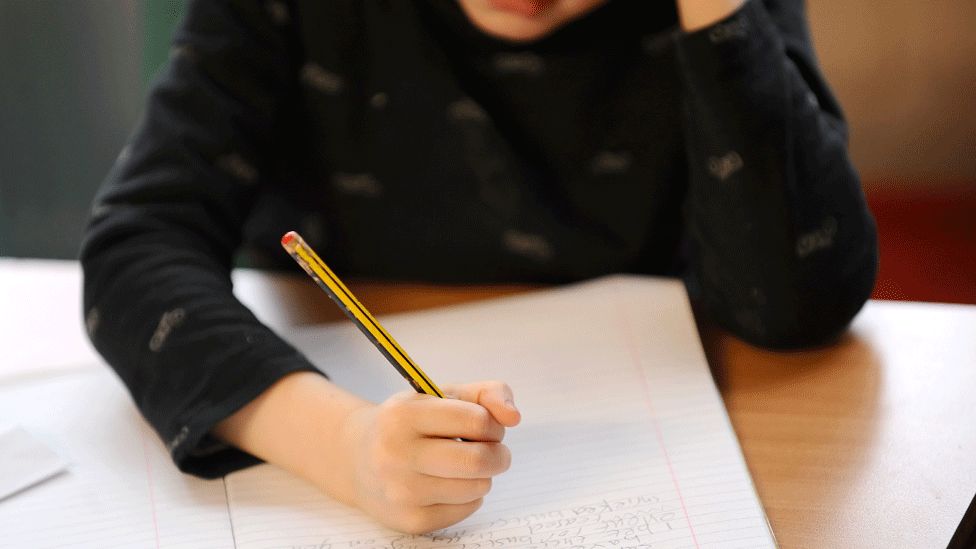Primary 1 assessments to be modified but not scrapped
- Published

Changes are to be made to controversial assessments undertaken by children in primary one.
The assessments - branded tests by critics - are designed to measure literacy and numeracy.
Critics want them scrapped and campaigners have urged parents to withdraw their children from them.
The Scottish government said the assessments would be modified as a result of feedback from teachers. However, they will not be scrapped.
It follows a report from the Primary 1 Practitioner Forum, made up of interested parties including teachers and academics.
They cited areas for improvement including:
- Stronger guidance to inform how teachers interact with children and support them during the assessments
- Guidance on how to ensure the assessments are delivered in a way that is compatible with a play-based classroom environment
- A publicly available rationale setting out the possible uses and purposes of the assessments to ensure they are not perceived as "high stakes"
Deputy First Minister John Swinney said: "I would like to thank the P1 Practitioner Forum for their recommendations, which are grounded in the realities of teaching P1 and are informed by their own experiences and professional knowledge.
"We will work to make immediate improvements where we can to enhance the experience of both learners and educators and ensure the assessments can continue to be delivered as part of everyday learning and teaching."
The Scottish government explained that the "immediate changes" to be implemented would improve practical help for teachers in the "planning and administering" of assessments which are due to take place in May and June.
The assessments were introduced across Scotland during the 2017-18 school year.
The government has always insisted they were not "high stakes tests" and were designed to help raise attainment.
They were designed to give an indication of the level children had reached by the time they started school.
That data could then be used to measure the impact of schemes to raise attainment and as a benchmark for subsequent assessments carried out in P4 and P7.
Will the change satisfy the critics?
By BBC Scotland education correspondent Jamie McIvor
These are not fundamental changes to Primary 1 assessments - they are modifications.
The aim is to deal with specific concerns such as fears that they might be seen as high stakes tests or claims that the assessments had left children distressed.
The changes may help deal with some practical issues which schools and teachers have faced or ensure that the way the assessments are carried out is more consistent.
However, they are unlikely to satisfy those whose opposition is more fundamental.
Some teachers believe the P1 assessments do not provide any useful information which they could not already obtain by other means. In that sense, they considered them a waste of time and effort.
Other opponents believe the very idea of carrying out anything which might be seen as "testing" in P1 was simply wrong in principle. The notion, they argued, ran counter to the idea of learning through play and risked leading to "teaching to the test".
Reassurances this was not the intention did little to appease such criticism and modifications now are unlikely to so either.
But how do parents feel about the assessments? It is impossible to say just where opinion lies.
Some parents have asked schools not to put their children through the assessments.
BBC Scotland spoke to others last year who had heard little about the scheme beforehand and seemed surprised it was so controversial.
At they very least, there is bound to be a battle for hearts and minds.
Critics have argued that they were a waste of teachers' time and could lead to "teaching to the test". Some teachers also reported that the assessments had caused some children distress.
Prof Sue Ellis of Strathclyde University, who chaired the forum, said it was important that people listened carefully to what teachers on the forum had to say.
She added: "They offer plenty of good ideas about how to make the SNSAs (Scottish National Standardised Assessments) work in practice and the report contains useful advice as well as recommendations for the future."
Upstart Scotland - which campaigns for play-based learning - called for the assessments to be scrapped completely.
It has been urging parents to ask schools not to put their children through the assessments. Other critics include the EIS union.
The government later said that any decisions to withdraw children from the scheme were up to individual schools.
Last year the Scottish government was defeated in parliament on a motion condemning the assessments.
Following the defeat, an independent review of the assessments was announced. This is due to report soon.
'Absolutely farcical'
Opposition parties accused Mr Swinney of ignoring the will of parliament by announcing the latest changes.
Scottish Conservative education spokesperson Liz Smith MSP said: "Rather than wait for the result of the independent review into Primary 1 testing, John Swinney has clearly decided to plough on regardless.
"It shows that he has absolutely no intention of listening to the voice of parliament when it voted to scrap these assessments last year."
Scottish Labour education spokesman Iain Gray added: "This is absolutely farcical from John Swinney, and the latest example of him completely botching an issue in the education brief.
"The will of the Scottish Parliament is quite clear - it voted to scrap these tests for Primary 1 pupils."
- Published28 August 2018
- Published15 August 2018
- Published14 August 2018